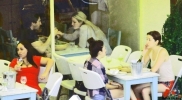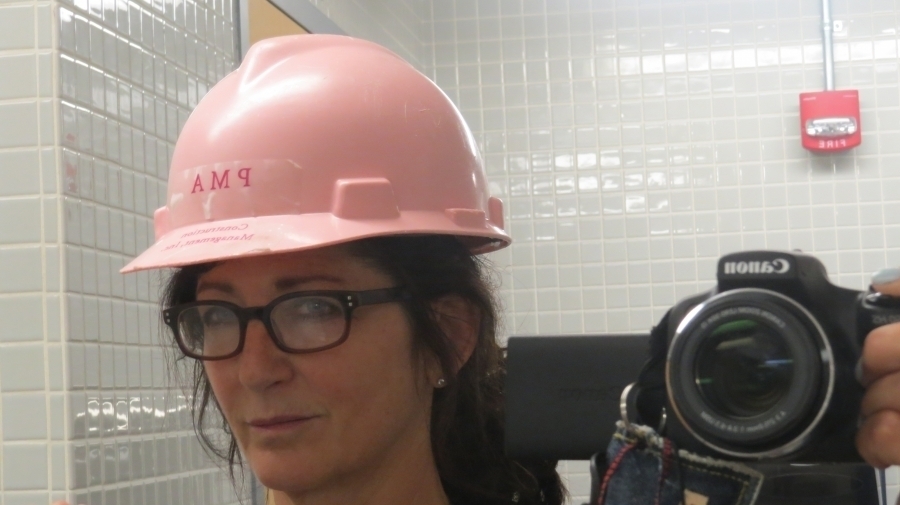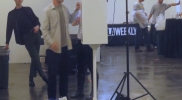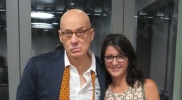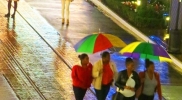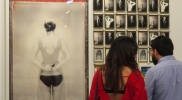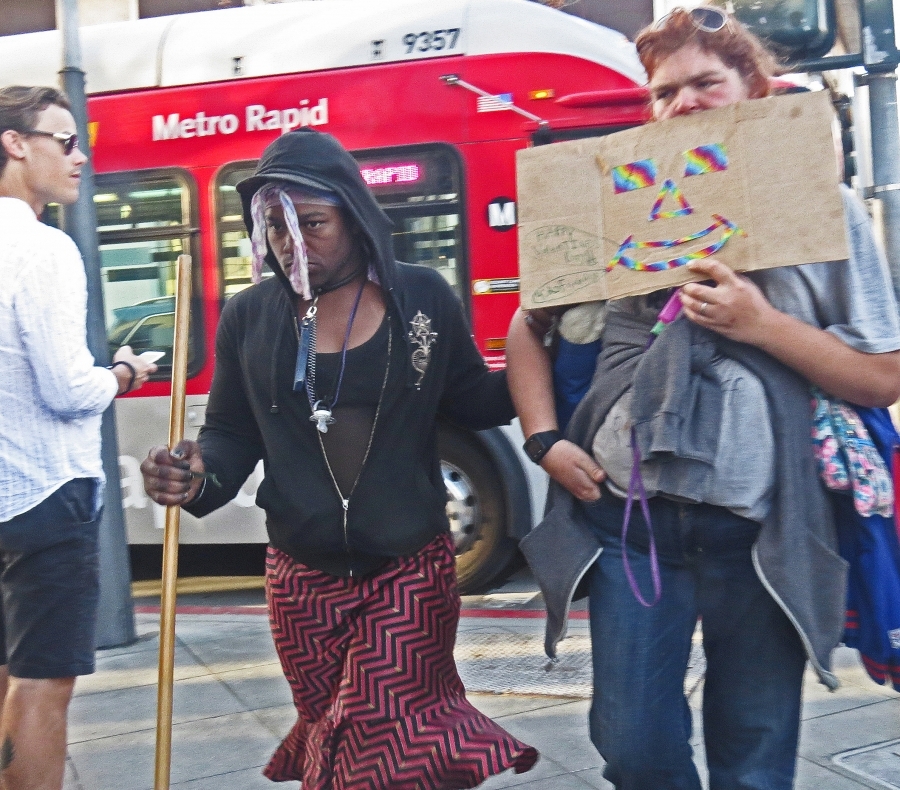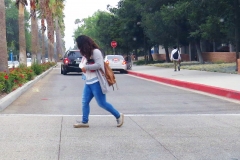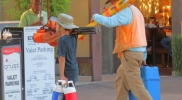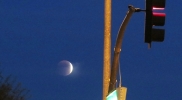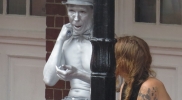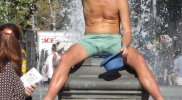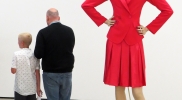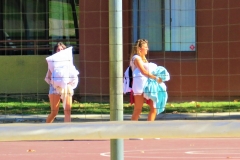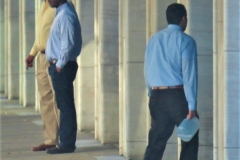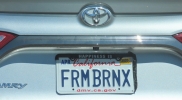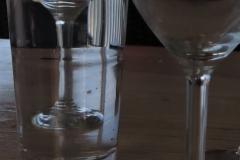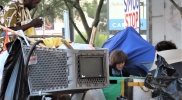|
|
Best Trivia - Books
|
Favorite Trivia – BOOKS & READING & PUBLISHING
|
| “With all the books still left for me to read I am assured of future happiness.”
Jules Renard (journals)
|
“I love my books as drinkers love their wine;
The more I drink the more they seem divine.”
Francis Bennoch – My Books
|
| “I had always imagined paradise as a kind of library.”
Jorge Luis Borges
|
| “One learned to love books as one learned to love women: Gradually. And then with mounting passion. And then with more expertise, and discernment. And finally, with more love.”
Eric Idle – The Books That Changed My Life (ed. by Bethanne Patrick)
|
| “We read to free ourselves from the grind and the misery and big ticking time-bomb questions of life. We read for the same reason we walk alone in the woods or squeeze our ears between headphones. We all need contemplative time, time away, time in another world altogether. For me, that happens when I pick up a good book—or for that matter, a good newspaper.”
T.C. Boyle
|
|
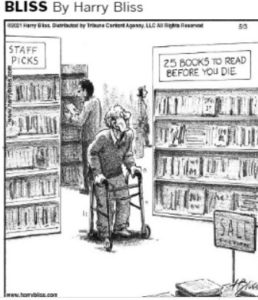
|
“A PRECIOUS, mouldering pleasure ’tis
To meet an antique book,
In just the dress his century wore;
A privilege, I think.”
Emily Dickinson
|
|
“My book and heart
must never part.”
Eugene Field – The Love Affairs of a Bibliomaniac
|
| autobiography: Fiction written by someone who knows the facts – Anonymous
Leonard Louis Levinson – Webster’s Unafraid Dictionary: Defiant Definitive Put-Downs
|
|
“I read a lot. I read because the vast wholeness of existence (the immeasurable, multifaceted beauty of what it means to be human) cannot be perceived through one life.” [May 1, 2008]
Mallory Smith – Salt In My Soul: An Unfinished Life
|
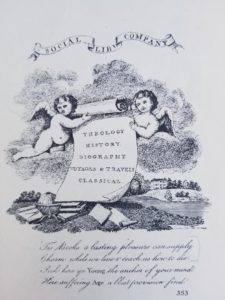
Bookplate poem:
“Tis books a lasting pleasure can supply
Charm while we live & teach us how to die…”
Fridolf Johnson – A Treasury of Bookplates
|
| “After three days without reading, talk becomes flavorless.”
David Baird – A Thousand Paths to Enlightenment
|
| “Thoreau was an omnivorous reader and at one point in Walden, the wonderful aphoristic account of his experiment of living alone in the woods, he effuses: ‘How many a man has dated a new era in his life from the reading of a book!'”
James Geary – The World in a Phrase: A Brief History of the Aphorism
|
| Re Kondo method of tidying up (‘sparking joy’): “Word spread over social media that the Kondo method allowed you to keep just 30 books . . . I think this occurred because in one of my books I said that when I was going through my books I had about 30 books left,” Kondo says.
“Kondo clarifies her stance, in case there remains any confusion. ‘The important concept of my method is that you focus not on what you want to discard but what you want to retain, what you want to keep in your life. So if you love books, if you’re passionate about books, go ahead and keep them with every confidence.'”
Yvonne Villarreal – Los Angeles Times, January 24, 2019
|
| “Although it’s never been easy for me to read, I do find it convenient. You basically carry a book and read it at will, which is fantastic for people like me who travel a great deal. I still read a lot of paper books, not because I don’t think e-reading is fantastic—I do—but because I don’t have to worry about plugging anything in or losing power and all that kind of thing when I have a paper book with me.”
Tommy Hilfiger – The Books That Changed My Life (ed. by Bethanne Patrick)
|
| “Every good book should be re-read as soon as it is finished. After the sketchiness of the first reading comes the creative work of reading. We must then know the problem that confronted the author. The second, then the third reading . . . give us, little by little, the solution of this problem.”
Gaston Bachelard – The Poetics of Space
|
| “What good is there in books? The French ones keep you up, the Russian make you sleep.” (Famusov to Liza)
Alexander Griboedov – Woe From Wit: A Verse Comedy in Four Acts (trans. Betsy Hulick)
|
| “She was reading a thin volume with a grey cover. Now and then the corners of her mouth twitched, and a flash of pleasure lit up her face. He was jealous of the man whose words she seemed to find so absorbing.”
Gustave Flaubert – Sentimental Education
|

Bookshop Memories – George Orwell
|
| “If I had a bookstore, I’d make the mystery section really hard to find.”
Anonymous (Jen Campbell – Weird Things Customers Say in Bookstores)
|
| “I am simply a book drunkard.”
L. M. Montgomery
|

“[Joe] Orton was a playwright, and his theater debut, Entertaining Mr. Sloane, was first performed in 1964. Its menacing satire was a slap in the face to a society Orton had begun to deride with a passion after spending six months in prison for defacing library books [along with boyfriend Kenneth Halliwell].”
[According to Jonathan James (The Guardian, October 14, 2011), “Orton and Halliwell delighted in cutting up and rearranging the covers of the jaded volumes on the library shelves, creating bizarre collages that turned dreary 1950s book jackets into hilarious, erotically charged works of art. The poet John Betjeman became a near-naked tattooed man. Giant cats invaded Venice on the front of an Agatha Christie novel. Collins’ Guide to Roses had a monkey’s face disturbingly inserted into the heart of the yellow rose that emblazoned it.
“Instead of laughing, fining them, and telling them not to do it again, the system came down hard. Orton had his own explanation for the harsh punishment their vandalism received: he said they were treated brutally “because we’re queers”]
Legendary Authors and the Clothes They Wore – Terry Newman
|
| “Of all the diversions of life, there is none so proper to fill up its empty spaces as the reading of useful and entertaining authors.”
Joseph Addison – The Spectator, No. 93, June 16, 1711
|
| Barbara Davis who works in the shipping department at LAPL Central, said to Susan Orlean: “I don’t like to read too much. . . You read and read and read and read, and then what?”
Susan Orlean – The Library Book
|
| “If my books had been any worse, I should not have been invited to Hollywoood, and if they had been any better, I should not have come.”
Raymond Chandler
|
|

“My first wish is that you may really enjoy this book and my next wish is that you may remember where you borrowed it.”
Bookplate (Jay C. Powers)
|
| “No matter how you describe yourself, you can get more wisdom, more grace, and more of the world if you look beyond your own experience, as well as looking for it, in what you read.”
Stephen Burt – The Poem Is You
|
|
“I love the prose that comes towards me like a man, with sparkling eyes, with a loud voice, breathing hard and with great gestures of the hands. I want to hear the writer laugh and cry in it, to hear him whisper and shout, to feel him sigh and pant. I want his language to loom up before me like a tangible and resounding organism; I want him, when I read him in my room, to reveal to me a spirit that enters into me and seems to ascend within me from out of his [or her] pages.”
Lodewijk Van Deijssel (Christopher Morley’s Book of Days for 1931 [February 9])
|
| “There is nothing more feminine than indolence. Étienne Balsan was amazed at the amount of time Chanel could spend in bed in the morning reading the newspaper. Chanel herself said, ‘I know how to be inert.'”
Karen Karbo – The Gospel According to Coco Chanel
|
| “Because of the amount of time they take, I have never had a pedicure. I don’t think I’ve had more than five manicures in twenty years, primarily because you can’t read a book at the same time.”
Intimations – Zadie Smith
|
| “I go to books and to nature as the bee goes to a flower, for a nectar that I can make into my own honey.”
John Burroughs
|
 |
| “I jilt twenty books whenever I fix on one.”
The Heart of Emerson’s Journals (ed. by Bliss Perry)
|
| “I am not a glutton for punishment, but I am a glutton for books.”
Patty Martino Alspaugh
|
Customer: “Will you be open so I can buy the new Harry Potter book?”
Bookseller: “Yep, we’re having a midnight opening.”
Customer: “Great. What time?”
Jen Campbell – Weird Things Customers Say in Bookstores
|
| “It’s not who you know. It’s what you read.”
Buzz advertisement
|
| “The way things are, we can’t always move across the country to the great coach or master artist. But in literature it’s different. One can hang out with the best, day and night. They are all at hand, in the library and the bookstore.”
Marvin Ball (Planet on the Table)
|
“Not all readers are leaders,
but all leaders are readers.”
Harry S. Truman
|
| “One of the reasons you pick up a work is the hope that when you close the book you’ll feel elevated.”
Barry Lopez
|
|

|
| “Every week for eighteen years now, I’ve written a [book] review: snappy opening, plot description, critical commentary, a few characteristic quotes, sign off. And it’s agony every week; I just sweat it out. But now, at least, I get to choose which books I review, and I choose books I expect to like.”
Ron Charles – The Books That Changed My Life (ed. by Bethanne Patrick)
|
| “Mostly, I find myself coming out of the library with all women writers. I keep hoping the library attendant won’t notice, but when 8 out of 8 of the books you take out are by women, you try not to look too dykey.”
Eve Babitz – Eve’s Hollywood
|
| “When making decisions about what to read, you must primarily consult yourself the way you do in a relationship, since you are intellectually mating with any author you read intently.”
J. Allyn Rosser (Planet on the Table)
|
| “Neurologists have found that, when watching television or film, the viewer’s eyes remain idle, straight ahead, but when reading, the actual physical movement of scanning the page from left to right (or right to left, or up and down, depending) stimulates and conditions the brain, a Stairmaster of the mind.”
Lewis Buzbee – The Yellow-Lighted Bookshop
|
| “So we have understood the task of the bookseller, we have applied ourselves to carry it out as best we can, and our results have certainly gone beyond our expectations [La Maison des Amis des Livre]… Have confidence in the good will of people… understand them through constant observation, give them as much of yourself as possible, you will see that they are not so different, so far from you, and that, in short, to live in them is to live more fully in oneself.”
The Very Rich Hours of Adrienne Monnier: An Intimate Portrait of the Literary and Artistic Life in Paris Between the Wars – Richard McDougall
|
| “I was born crazy about books, and all my life has been a pleasant worsening of the state.”
Lawrence Clark Powell – A Passion for Books
|
“There is no frigate like a book
To take us lands away,
Nor any coursers like a page
Of prancing poetry.
This traverse may the poorest take
Without oppress of toll;
How frugal is the chariot
That bears a human soul!”
Emily Dickinson
|
| “A great many People are fond of Books, as they are of Furniture; to dress and set off their Rooms, more than to adorn and enrich their Minds.” [DCCXXIV]
The Moral Maxims And Reflections of the Duke De La Rochefoucauld
|
| “There is more need of reading Men than Books.” [DCCLIV]
The Moral Maxims And Reflections of the Duke De La Rochefoucauld
|
| As for what regards the Order of these Reflections, the Reader will at first view discover, that as they are all upon different Matters, it was in a manner impossible to place them in an exact Method: And tho’ there are several upon the same Subject, it was not judged proper to place them always one after another, for fear of disgusting the Reader, who is generally best entertained with an agreeable Variety.” [Preface to the Reader]
The Moral Maxims And Reflections of the Duke De La Rochefoucauld
|
| “She wondered how much of him was real. How much was Robert Vandaveer and how much was cobbled up out of lines from songs, words from books, wisdom that fell ponderous as stones from the dust-dry tongues of dead philosophers.”
“Good ‘Til Now” (I Hate To See That Evening Sun Go Down – William Gay)
|
| “It [The Sword in the Stone] was a mass-market paperback that cost ninety-five cents, and I read and reread it so often that I still remember one of the cover blurbs: ‘Read it and laugh. Read it and learn. Read it and be glad you are human.'”
Gregory Maguire – The Books That Changed My Life (ed. by Bethanne Patrick)
|
| “My own library is beginning to become rounded but has a long way to go yet. Father complains: ‘Why get so many books when you can’t in a lifetime read one-tenth of what you already have?’ It is useless to explain and re-explain to him that having one book for reference when needed saves hours, maybe days, of search when strength and time are so limited. Poor Father thinks that Mother and I are pure daft, and he will not listen to reason. Knowledge is my final key to success, and I will have it by hook or crook… Because I am misunderstood, should I hesitate in pursuing the costly process of buying knowledge? I will not.” [January 8, 1920]
Arthur Crew Inman – From a Darkened Room: The Inman Diary
|
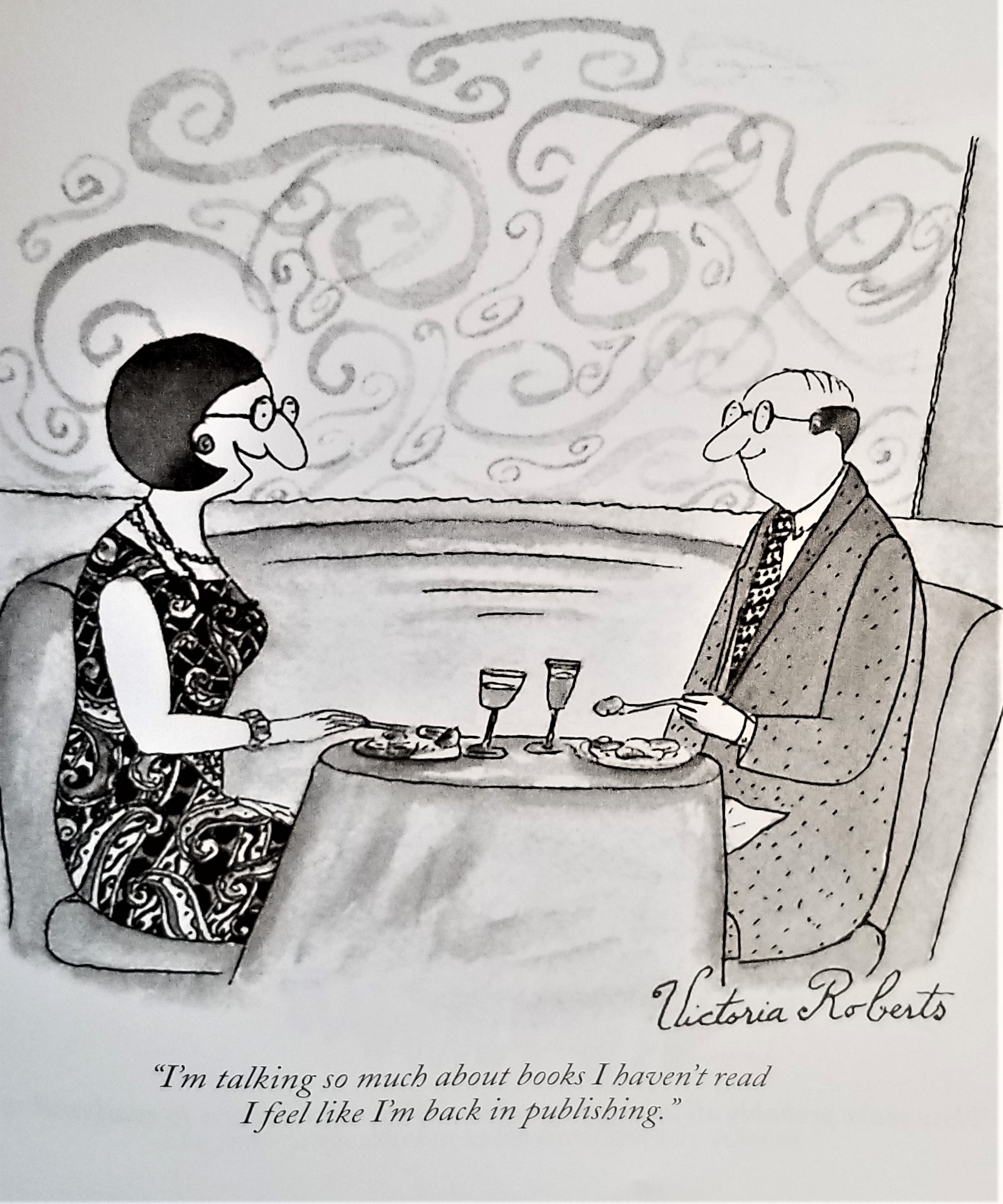 |
| “… I am convinced that a [book] cover is a sort of translation, that is, an interpretation of my words in another language—a visual one. It represents the text, but it isn’t part of it. It can’t be too literal. It has to have its own take on the book. Like translation, a cover can be faithful to the book, or it can be misleading… Once the cover exists it’s part of the book, and has an effect, either positive or negative. It either attracts or repels… As soon as the book puts on a jacket, the book acquires a new personality. It says something even before being read, just as clothes say something about us before we speak…Today more than ever the cover shoulders an additional weight. Its function is much more commercial than aesthetic. It succeeds or fails in the market.”
Jhumpa Lahiri – The Clothing of Books
|
| “In 2008, Gary Lutz gave a lecture called ‘The Sentence Is a lonely Place,’… specifically his punctilious focus on the sonic qualities of the sentence… These stories [The Complete Gary Lutz], glory in language, but Lutz also seems to suggest that it’s an insufficient tool for representing experience… these stories are not meant for rapid consumption. By his own admission, Lutz is after the ‘page-hugging, rather than page-turning reader.’… Ultimately, this volume is best experienced piecemeal… there for when you need a tonic for the dull verbiage of everyday life.”
Adam Wilson’s review of The Complete Gary Lutz (“Book Forum,” Dec/Jan 2020)
|
| “I read ever and only to feel the power of Life with a capital L.”
Vivian Gornick
|
| “One Saturday Ken and Kelly took me into the back corner of the coffee bar [Upstart Crow and Co.] with a stack of books and gave me a history lesson. First, they told me about the book itself. The right page was the recto, the left the verso. The pages of a hardcover were bound in groups called signatures; the pages of a paperback were cut flush and glued to the spine in a process called perfect-binding. Gutter, colophon, deckled; the words and terms spilled out. Then they led me through the progress of the book’s development, from clay tablets incised with styli to papyrus scrolls, to hand-copied codices, to Gutenberg’s movable type, all the way to mass-market paperbacks.”
Lewis Buzbee – The Yellow-Lighted Bookshop
|
| “The man who loved books, no, the boy who was wild for them, insane for them, who climbed the stacks like a chimpanzee gone mad for them.
“I ate them like salad, books were my sandwich for lunch, my tiffin and dinner and midnight munch. I tore out the pages, ate them with salt, doused them with relish, gnawed on the bindings, turned the chapters with my tongue! Books by the dozen, the score and the billion. I carried so many home I was hunchbacked for years. Philosophy, art history, politics, social science, the poem, the essay, the grandiose play, you name ’em, I ate ’em.” [Guy Montag – Fahrenheit 451 (stageplay)]
Ray Bradbury – Zen in the Art of Writing
|
| “All orders today were from Amazon, one of which was for a Patricia Wentworth first edition that should have been £50 but sold for £4. The discrepancy arose because of the price-matching software that comes with Monsoon, which is set to match the lowest price on Amazon. When we listed our copy it was the cheapest, but subsequently it had dropped to match another copy which had undercut ours. Occasionally, to try to steal a bargain, people put up fake listings of expensive books that they want, but with ridiculously cheap prices. They then wait for the price-matching software to kick in and the copy of a genuine listing to drop to the price of the ghost listing that they have put up. They buy the book, then remove the ghost listing.”
Shawn Bythell – The Diary of a Bookseller
|
| “A devoted reader all his life, Phil [Jackson] delights in his annual tradition of giving a book to each member of the team, selecting the start of a long, midseason trip to bestow his gift. It’s something Phil has done since the beginning of his head coaching career back in Chicago 20 years ago. Phil gave out the books today before the team left for its first stop in Cleveland. It’s an extremely meaningful exercise for Phil and he takes it very seriously. Days or even weeks before, he starts formulating in his mind which book would be the perfect match for each player…The choices he makes are always interesting. Phil has given the same book to different players over the years. He gave Ron Artest one of his own books, Sacred Hoops. Phil said he chose that one because Ron is new to the team and needs to know how we do things. One of Phil’s favorite authors is Walter Mosley, so Phil picked two of Mosley’s books. Six Easy Pieces: Easy Rawlins Stories went to Andrew Bynum. The Right Mistake, about an ex-convict, was selected for Lamar Odom… Pau got 2666, a novel by Chilean author Roberto Bolano about unsolved murders in Mexico. It was Pau who asked about the book, but we’ll see how enthusiastic he is after receiving this one. It’s 898 pages. One of Phil’s other choices was Dreams from My Father, President Barack Obama’s book, for Shannon Brown. Kobe Bryant and Jordan Farmar have said they never read the books. Knowing that players are like that, why does Phil still give them out? I asked him that when I first met him and he told me they don’t have to read it that day. The book may sit untouched for 20 years, but maybe when they become a father, or maybe when they retire, or maybe when they go into coaching, or maybe when they are simply curious, they will be inspired to pick it up and reflect on the choice he made for them. And if it resonates with them at that point, he will feel that his mission was accomplished… Phil signs every book and adds a message. Just as he is certain they will open the book someday, he is certain they will also open their heart and read the message.” [January 20, 2010]
Jeanie Buss – Laker Girl
|
| “Read the best books first or you may not have a chance to read them at all.”
Thoreau
|
| “Was it Thomas Hardy who had an entire shelf of his own books, sent by strangers wanting his signature, but not returned? I now do likewise. It’s flattering in a way, and you can’t have it both ways; an imposition, too, especially when there’s not a return-stamped envelope.” [January 3, 2005]
Ned Rorem – Facing the Night: A Diary (1999-2005) and Musical Writings
|
| “The covers of this book are too far apart.”
Ambrose Bierce
|
Customer: “Hi”
Bookseller: “Hi there, how can I help?”
Customer: “Could you please explain kindle to me.”
Bookseller: “Sure. It’s an e-reader, which means you download books and read them on a small hand-held computer.”
Customer: “Oh, ok, I see. So … this Kindle. Are the books on that paperback or hardback?”
Jen Campbell – Weird Things Customers Say in Bookstores
|
| The truly rare edition of Lawrence’s Lady Chatterley’s Lover is the second edition because it was made of cheaper stock than the first edition (so not as durable) and was of a limited run of 200 copies versus the 1,000 copies of the first edition (both printed in Florence in 1928).
Lawrence Clark Powell – A Passion for Books
|
| “Real happiness lies in the little things, in a bit of garden work, in the rattle of the teacups in the next room, in the last chapter of a book.”
W. N. P. Barbellion – The Journal of a Disappointed Man
|
| “What heaps of things to be done! How short the time to do them in! An appetite for knowledge is apt to rush one off one’s feet, like any other appetite if not curbed. I often stand in the centre of the Library here and think despairingly how impossible it is ever to become possessed of all the wealth of facts and ideas contained in the books surrounding me on every hand. I pull out one volume from its place and feel as if I were not more than giving one dig with a pick in an enormous quarry. The Porter spends his days in the Library keeping strict vigil over this catacomb of books, passing along between the shelves and yet never paying heed to the almost audible susurrus of desire—the desire every book has to be taken down and read, to live, to come into being in somebody’s mind. He even hands the volumes over the counter, seeks them out in their proper places or returns them there without once realizing that a Book is a Person and not a Thing. It makes me shudder to think of Lamb’s Essays being carted about as if they were fardels.” [October 3, 1908]
W. N. P. Barbellion – The Journal of a Disappointed Man
|
| “When I am attacked by gloomy thoughts, nothing helps me so much as running to my books. They quickly absorb me and banish the clouds from my mind.”
Michel de Montaigne
|
| Rich Fare:
“A natural turn for reading and intellectual pursuits probably preserved me from the moral shipwreck, so apt to befall those who are deprived in early life of the paternal pilotage…Later experience enables me to depose to the comfort and blessing that literature can prove in seasons of sickness and sorrow…Depressed bodily by the fluid that damps everything, I got intellectually elevated with Milton, a little merry with Swift, or rather jolly with Rabelais, whose Pantagruel, by the way, is quite equal to the best gruel with rum in it…
“Many, many a dreary, weary hour have I got over—many a gloomy misgiving postponed—many a mental or bodily annoyance forgotten, by help of the tragedies and comedies of our dramatists and novelists! Many a trouble has been soothed by the still small voice of the moral philosopher—many a dragon-like care charmed to sleep by the sweet song of the poet, for all which I cry incessantly, not aloud, but in my heart. Thanks and honor to the glorious masters of the pen, and the great inventors of the press! Such has been my own experience of the blessing and comfort of literature, and intellectual pursuits…”
T. Hood (Letter to the Manchester Athenaeum, 1843) – The Book Lovers’ Anthology, ed. by R.M. Leonard
|
| “Lucia Berlin’s stories are electric; they buzz and crackle as the live wires touch. And in response, the reader’s mind, too, beguiled, enraptured, comes alive, all synapses firing. This is the way we like to be when we’re reading—using our brains, feeling our hearts beat.”
Lydia Davis – Essays One
|
| “George Steiner describes the intellectual as one who can’t read without a pencil in her hand. One who wants to talk back to the book, not take notes but make them…”
Mary Ruefle – Planet on the Table: Poets on the Reading Life, eds: Bryan and Olsen
|
| “In the Alexandrian market, the books would be written on papyrus, a reedy Nile plant made into a writing surface by cutting the plant’s stem into narrow strips, which were then beaten to an airy thinness, dried in the sun, and pasted together into sheets. These sheets were glued to one another in long scrolls, which were stored in cedar oil in earthenware jars to prevent vermin and rot. The papyrus scroll had two great disadvantages, however. If you wanted to leap ahead or backward in a scroll, you had to scroll and scroll. And while supple and plentiful, papyrus was also vulnerable to the elements and deteriorated quickly.
“But it was cultural and economic jealousy that determined the shift from papyrus. The librarians at Alexandria knew that the rulers of Pergamum, in Asia Minor, were amassing a rival library . . . In the rush to provide books for the new library, booksellers made thousands upon thousands of books, thus creating a great demand for papyrus. In the fourth century CE, to keep their advantage, Egyptians forbid the export of papyrus. To make up for the lack of papyrus, the librarians and booksellers of Pergamum used sheepskin or goatskin to create a new writing surface called parchment, which, in Latin means ‘of Pergamum’. . . After soaking in water, sheepskins were covered with lime to loosen the hairs, and the skins were scraped clean, stretched, and dried. It might take twenty skins to make a small book, but you could eat the leftovers. The real advantages to parchment, though, were that it lasted longer, and it was thin enough and sturdy enough to fold. It was parchment’s pliability that made the transition from scroll to codex feasible. The codex is the modern book, comprised of pages attached to a book’s spine that open along the axis of that spine.
“The Chinese invented paper. . . Papermaking spread throughout Asia, and by the ninth century CE, had found its way into Arabic countries, and from there slowly to Europe. . . Paper was much cheaper than parchment or silk, more durable than papyrus or palm leaf, and lighter and less bulky than any of the materials used before.”
Lewis Buzbee – The Yellow-Lighted Bookshop
|
| America’s first African American—and female— Librarian of Congress Carla Hayden talks to Andrew Carroll (jan/feb 2020, AARP):
“… You have plenty of books to choose from here.
‘More than 24 million books, but then there are also lots of other items, like diaries and maps.’
“… Why do we have a Library of Congress?
‘Its original mission is still part of its mission now, and that is to serve Congress. It started in 1800 with about 700 books, mainly legal books to serve the new Congress. After the British burned the library during the War of 1912, Thomas Jefferson sold to the library his collection. It was about 6,000 books, and that was the largest personal library in the United States. It included religious tests—the Bible, the Koran—books in different languages. He said that there is no subject that members of Congress should not have to refer to. That set the framework for future collecting.'” |
| “If the books which you read are your own, mark with a pen [quelle horreur] or pencil [yes] the most considerable things in them which you desire to remember. Then you may read that book the second time over with half the trouble, by your eye running over the paragraphs which your pencil has noted. It is but a very weak objection against this practice to day, ‘I shall spoil my book;’ for I persuade myself that you did not buy it as a bookseller, to sell it again for gain, but as a scholar, to improve your mind by it; and if the mind be improved, your advantage is abundant, through your book yields less money to your executors.”
I. Watts (Logic) – The Book Lovers’ Anthology, ed. by R.M. Leonard
|
| “Book are chiefly useful as they help us to interpret what we see and experience.”
W.E. Channing – Self-Culture
|
“Lolita, light of my life, fire of my loins. My sin, my soul. Lo-lee-ta: the tip of the tongue taking a trip of three steps down the palate to tap, at three, on the teeth. Lo. Lee. Ta.
She was Lo, plain Lo, in the morning, standing four feet ten in one sock. She was Lola in slacks. She was Dolly at school. She was Dolores on the dotted line. But in my arms she was always Lolita.”
Lolita (first two paragraphs) – Vladimir Nabokov
|
| “Books have and contain divers pleasing qualities to those that can duly choose them. But no good without pains; no roses without prickles. It is a pleasure not absolutely pure and neat; no more than all others it hath his inconveniences attending on it, and sometimes weighty ones: the mind is therein exercised, but the body (the care whereof I have not yet forgotten) remaineth there—whilst without action, and is wasted, and ensorrowed. I know no excess more hurtful for me, nor more to be avoided by me, in this declining age.”
Montaigne
|
| “I am speaking of the rarity of a certain kind of sunshine in our literature, and expressing a little rainy-day wish that we had a little more of it. It ought to be collected. There should be a joyous set of elegant extracts—a Literatura Hilaris or Gaudens,—in a score of volumes, that we could have at hand, like a cellaret of good wine, against April or November weather. Fielding should be the port, and Farquhar the champagne, and Sterne the malmsey; and whenever the possessor cast an eye on his stock he should know that he had a choice draught for himself after a disappointment, or for a friend after dinner,—some cordial extract of Parson Adams, or Plume, or Uncle Toby, generous as heart could desire, and as wholesome for it as laughter for the lungs.”
J.H. Leigh Hunt – Cheerful Poets
|
| “At Mr. Dilly’s to-day… before dinner Dr. Johnson seized upon Mr. Charles Sheridan’s Account of the Late Revolution in Sweden, and seemed to read it ravenously, as if he devoured it, which was to all appearance his method of studying. ‘He knows how to read better than anyone (said Mrs. Knowles); he gets at the substance of a book directly; he tears out the heart of it.’
“He kept it wrapt up on the tablecloth in his lap during the time of dinner, from an avidity to have one entertainment in readiness when he should have finished another; resembling (if I may use so coarse a simile) a dog who holds a bone in his paws in reserve, while he eats something else which has been thrown to him.” [April 15, 1778]
James Boswell – Life of Johnson
|
| “I am always for getting a boy forward in his learning; for that is a sure good. I would let him at first read any English book which happens to engage his attention; because you have done a great deal when you have brought him to have entertainment from a book. He’ll get better books afterwards.”
Samuel Johnson – Life (Boswell)
|
| “I yet retain, and carefully cherish, my love of reading. If relays of eyes were to be hired like post-horses, I would never admit any but silent companions: they afford a constant variety of entertainment, which is almost the only one pleasing in the enjoyment, and inoffensive in the consequence…. Every woman endeavours to breed her daughter a fine lady… Learning, if she has a real taste for it, will not only make her contented, but happy in it. No entertainment is so cheap as reading, nor any pleasure as lasting. She will not want new fashions, nor regret the loss of expensive diversions, or variety of company, if she can be amused with an author in her closet.”
Lady Mary Wortley Montagu – Letters
|
| “I would rather be a poor man in a garret with plenty of books than a king who did not love reading.”
Lord Macaulay
|
|
“I could read all day every day for the rest of my life and still be behind, so I do balance my mornings of lectures (which I do love) and reading with a kind of cultural and social life. People are still infinitely more important to me than books, so I will never be an academic scholar. I know this and know also that my kind of vital intellectual curiosity could never be happy in the grubbing detail of a PhD thesis. I simply don’t believe that kind of specialization is for me. I like to read widely, in art, psychology, philosophy, French, and literature, and to live and see the world and talk deeply with people in it and to write my own poetry and prose, rather than becoming a pedantic expert on some minor writer of 200 years back, simply because he has not been written about yet.” [November 14, 1955]
“It is often tempting to hide from the blood and guts of life in a neat special subject on paper where one can become an unchallenged expert, but I, like Yeats, would rather say: ‘It was my glory that I had such friends,’ when I finally leave the world.” [November 22, 1955]
Sylvia Plath – Letters Home: Correspondence 1950-1963, ed. by Aurelia Schober Plath
|
| “Far more seemly were it for thee to have thy study full of books, than thy purse full of money.”
J. Lyly
|
| “When I speak of being in contact with my books, I mean it literally. I like to lean my head against them.”
J.H. Leigh Hunt
|
“Next o’er his books his eyes began to roll,
In pleasing memory of all he stole,
How here he sipped, how there he plundered snug,
And sucked all o’er, like an industrious bug.”
A. Pope – The Dunciad
|
| “As great philosophers hold that the esse of things is percipi, so a gentleman’s furniture exists to be looked at. Nevertheless, sire, there are some things more fit to be looked at than others; for instance, there is nothing more fit to be looked at than the outside of a book. It is, as I may say, from repeated experience, a pure and unmixed pleasure to have a goodly volume lying before you, and to know that you may open it if you please, and need not open it unless you please. It is a recourse against ennui, if ennui should come upon you. To have the resource and not to feel the ennui, to enjoy your bottle in the present, and your book in the indefinite future, is a delightful condition of human existence. There is no place, in which a man can move or sit, in which the outside of a book can be otherwise than an innocent and becoming spectacle.”
T.L. Peacock
|
| “I own that I am disposed to say grace upon twenty other occasions in the course of the day besides my dinner. I want a form for setting out upon a pleasant walk, for a moonlight ramble, for a friendly meeting, or a solved problem. Why have we none for books, those spiritual repasts—a grace before Milton—a grace before Shakespeare—a devotional exercise proper to be said before reading the Fairy Queen?
Charles Lamb – Grace before Meat
|
| “The book I was reading I was rereading. Because some time before that terrible day I had reached a juncture in my reading life that is familiar to those who have been there: in the allotted time left to me on earth, should I read more and more new books, or should I cease with that vain consumption—vain because it is endless—and begin to reread those books which had given me the intensest pleasure in my past, books I had all but forgotten in their details, but loved in the shadows they cast over me, the moods created by the very thoughts of them. And there was curiosity, too, the curiosity of revisiting and remeeting.”
Mary Ruefle – Planet on the Table: Poets on the Reading Life, eds: Bryan and Olsen
|
| “I never travel without books, whether in peace or in war: they’re the best provender I know of for man’s earthly journey.”
Montaigne
|
| Latin: “Quid est dulcius otio litterato?”
English: “What is sweeter than literary leisure?”
Cicero
|
| “A Pew Research Center survey in January [2018] revealed that 24% of all U.S. adults did not read a book in any format in the past year.”
Brian Crosby – The Whiteboard Jungle
|
| “The Middle Ages were unkind to Europe’s booksellers. . . The Christian empire sought to defend its slippery purchase on the good souls of Europe by exercising rigid controls over free thought and its public expression. . . For nearly a thousand years, publishing in Europe was virtually confined to Bibles, church-sanctioned religious tracs, and those classic works—science and philosophy—only a privileged few could access. Most new books during these centuries were hand-copied by monks for their own studies and devotions. Some monastic orders also copied manuscripts to sell or barter. Books were so valuable during this time that they were customarily chained to desks or placed on shelves behind locked, iron grates.”
“. . . books that held the true word incarnate had to be works of art. Their covers were adorned with gold leaf, ivory, and precious gems, and their pages illuminated with the most ornate and costly scripts and illustrations. . . The histories tell us that Johannes Gutenberg invented his movable-type printing press in 1438 CE in Mainz, Germany. . .
“
Lewis Buzbee – The Yellow-Lighted Bookshop
|
| “When I go out of prison, R—— will be waiting for me. . . I believe I am to have enough to live on for about eighteen months at any rate, so that if I may not write beautiful books, I may at least read beautiful books; and what joy can be greater?
Oscar Wilde – De Profundis
|
|
Five-year-old girl: “Mommy, I could stay in here [bookstore] all day!”
Mother: “I don’t know why you read; it’ll never get you anywhere.”
Jen Campbell – Weird Things Customers Say in Bookstores
|
|
Customer: “Hi, I’m looking for a stuffed animal.”
Bookseller: “I’m afraid we don’t really have any of those. We do have some books for babies, though. They’re over here.”
Customer: “Er, it’s for a B-A-B-Y. What’s wrong with you? Babies can’t read?”
Jen Campbell – Weird Things Customers Say in Bookstores
|
| “My first novel, In Search of Snow, had bombed, and I made a huge mistake: I emptied my bank account to buy out my entire run so it wouldn’t be remaindered, thinking these first-edition peddlers would reimburse me. I was stuck with about three thousand copies, and since I had no money, I actually put a futon on top of boxes and boxes of my unwanted books. My bedside table was a box of books. My TV sat on a plank laid across boxes of books.”
Luis Urrea – The Books That Changed My Life (ed. by Bethanne Patrick)
|
|
Customer: “This book has a couple of tears to some of the pages.”
Bookseller: “Yes, unfortunately some of the older books haven’t had as much love as they should have done from previous owners.”
Customer: “So, will you lower the price? It says here it’s $20.”
Bookseller: “I’m sorry but we take into account the condition of the books when we price them; if that book was in a better condition, it would be worth a lot more than $20.”
Customer: “Well, you can’t have taken this tear here into account (points to page) or this one here (points to another page), because my son did those two minutes ago.”
Bookseller: “So, the book is now more damaged than it was before, because of your son?”
Customer: “Yes. Exactly. So will you lower the price?”
Jen Campbell – Weird Things Customers Say in Bookstores
|
| “During the nineteenth century, advances in printing technology made it feasible, for the first time, to print books in color rather than—as had been done for centuries—printing a book’s illustrations in back-and-white and then, in some instances, hand-coloring the images page by page, often by means of the pochoir, or stencil, method. Books from the earlier period, when sold without the addition of color, were sometimes hand-colored at home, and may thus be considered proto-coloring books of a sort.”
Leonard S. Marcus (The Annotated Phantom Tollbooth by Norton Juster)
|
| “Above all else, in my adult life I owe the Los Angeles Public Library almost everything. When I started to work as a librarian I was able to compare dirty Old Central to being a janitor, a salesman, a ticket broker, a newspaper drudge and a parking lot attendant and I felt like a King. When I started I sat at a reference desk with rotary phones that were connected to a switchboard operator, put periodical requests into Lampson tubes, searched a card catalog and met the most interesting people in my life, including the mother of my daughter. From that desk I have seen the world turn and things happen that I could never have dreamed.
“From that humble perch in the heat of Los Angeles I met movie stars, a presidential candidate, famous writers, and hundreds of really incredible librarians who taught me everything I know. By a set of incredible strokes of good fortune I actually wrote a book that is in the Library of Congress. Thank You so much LAPL. [August 27, 2012]
Glen Creason – Dear Los Angeles (ed by David Kipen)
|
| “Since 2001, when I bought the shop [The Bookshop], there have been tectonic shifts in the book trade, to which we have no choice but to adapt. Back then online selling was in its relative infancy, and AbeBooks was the only real player for second-hand books; Amazon at that point sold only new books. Because AbeBooks was set up by booksellers, the costs were kept as low as possible. It was a very good means of selling more expensive books—the sort that might have otherwise been hard to sell in the shop—and because there were relatively few of us selling through it back then, we could realize pretty decent prices. Now, of course, Amazon is consuming everything in its path. It has even consumed AbeBooks, taking it over in 2008, and the online market-place is now saturated with books, both real and electronic. Yet we have no real alternative but to use Amazon and AbeBooks through which to sell our stock online, so reluctantly we do. Competition has driven prices to a point at which online bookselling is reduced to either a hobby or a big industry dominated by a few huge players with vast warehouses and heavily discounted postal contracts. The economies of scale make it impossible for the small or medium-sized business to compete. At the heart of it all is Amazon, and while it would be unfair to lay all the woes of the industry at Amazon’s feet, there can be no doubt that it has changed things for everyone.”
Shawn Bythell – The Diary of a Bookseller
|
| “But how to categorize this elderly gentleman who keeps asking me [a librarian] to give him the password for his own email? I try to explain that it is not possible for me to know this, that only he knows this, but he just shakes his head in that indignant way that means, What kind of help desk is this?”
Weather – Jenny Offill
|
| “There is nothing I [Mr. Darcy] find more beautiful—please don’t laugh at me—there is nothing I find more beautiful than a woman reading: when she sinks deep into a book and forgets everything around her, because she is actually somewhere else entirely. The movement of her pupils, the deep breathing at a particularly dramatic scene, or her smile at a humorous passage. I would so love to have a woman living here, whom I could watch as she reads all day.”
Carsten Henn • The Door-To-Door Bookstore
|
| Walter Matthau’s response to his most influential book: “The Secret in the Daisy, by Carol Grace. . . . It took me from a miserable, unhappy wretch to a joyful, glad-to-be-alive human. I fell so in love with the book that I searched out and married the girl who wrote it.” |
| “The Middle Ages were unkind to Europe’s booksellers. . . The Christian empire sought to defend its slippery purchase on the good souls of Europe by exercising rigid controls over free thought and its public expression. . . For nearly a thousand years, publishing in Europe was virtually confined to Bibles, church-sanctioned religious tracts, and those classic works—science and philosophy—only a privileged few could access. . . Books were so valuable during this time that they were customarily chained to desks or placed on shelves behind locked, iron grates. . . . the books that held the true word incarnate had to be works of art. Their covers were adorned with gold leaf, ivory, and precious gems, and their pages illuminated with the most ornate and costly scripts and illustrations. . .
“The histories tell us that Johannes Gutenberg invented his movable-type printing press in 1438 CE in Mainz, Germany. . . It took Gutenberg years of experimenting before he printed his first Bible, the famous 42-line Gutenberg Bible of 1454. . . As with any historical watershed, the invention of Gutenberg’s press was not an isolated moment of insight. . . Europe was emerging from the suffocating religiosity of the Dark Ages; by the end of the fifteenth century, transoceanic exploration had begun, the Reformation was diluting the power of the Catholic church, and the Renaissance was in full swing. The ascendancy of the university, and yet another spike in the literacy rate, due in part to freer trade and improved economic conditions, added to the demand for books. . . A printer could create in one day what it might take a single monk six months to accomplish.
“A customer of the early age of printing would have entered a bookstore similar to one today, yet with some distinct differences. From the fifteenth to the eighteenth centuries, books were stored horizontally on their shelves, rather than vertically, and the spines would have faced the backs of the shelves rather than the customer. Most books would lack covers (title pages, however, were now included), be completely unbound, and stacked in loose quires (signatures of twenty-four pages). After choosing a book the customer would than select the color and cost of binding that would most suit the volume and his library decor. Or one could choose to read the book as is, without covers, an early prototype of the paperback. After the eighteenth century, books were sold in their bindings, and shelved vertically and spine out, as they are today.”
Lewis Buzbee – The Yellow-Lighted Bookshop
|
| “Back in 1899 the most powerful UK publishing houses agreed that they would only supply bookshops on the condition that the books were sold at the cover price and not discounted. And breach of this, they agreed, would result in all of them ceasing to supply any books to the culprit. This was known as the Net Book Agreement (NBA). The system worked well for everyone until 1991, when chain stores Dillons and Waterstones emerged, dwarfing the small independents. They quickly realized that they could circumvent the NBA under a clause that exempted damaged books. Using a marker pen, they scored a cross onto the edges of the books they wished to discount. Bitter fighting between the publishers and the big chains ensued, culminating in a ruling by the Office of Fair Trading that declared the NBA illegal in 1997.”
Shawn Bythell – The Diary of a Bookseller
|
|
Nobel Prize Winners for Literature, 1901-2019
Pulitzer Prize Winners for Fiction, 1918-2019
Pulitzer Prize Winners for Poetry, 1918-2019
|

Comments are closed.
|
|
